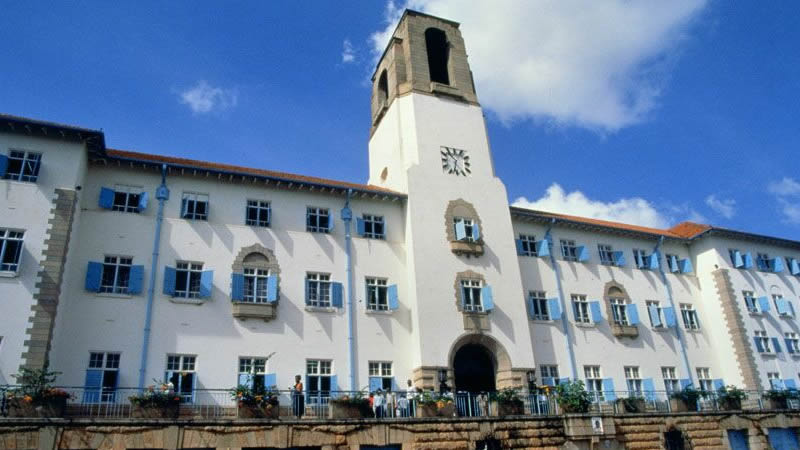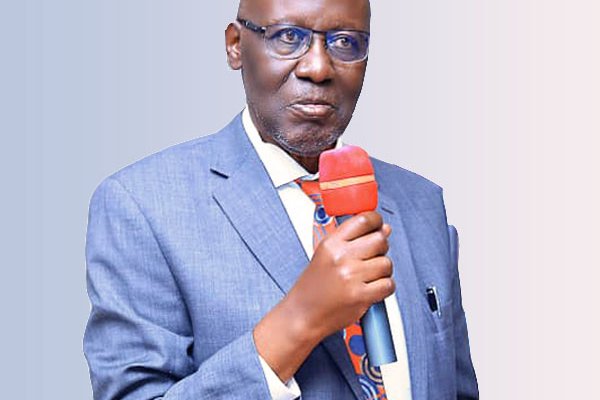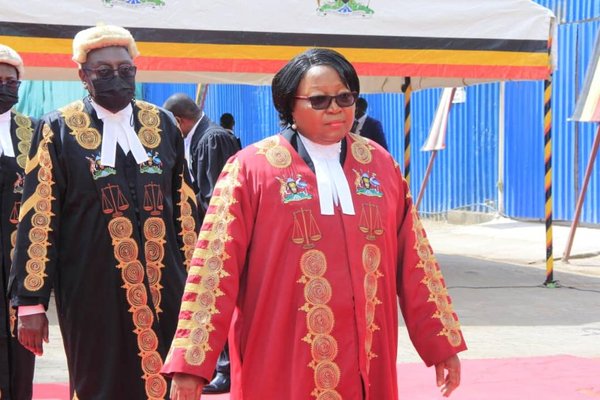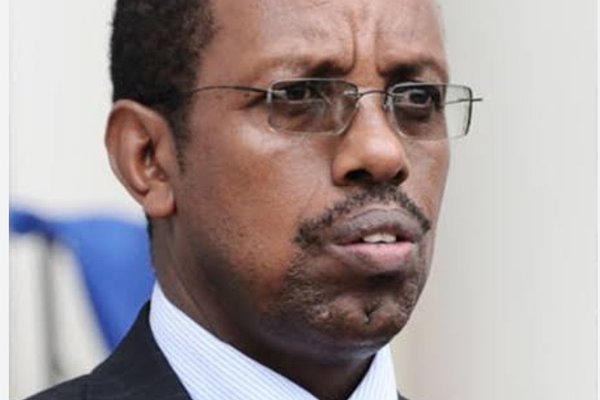By Julius Mugaga
On Friday, May 17, 2024 I was making some calls, reminding members about an upcoming annual general meeting when I started receiving endless horror calls from my workmates and fellow journalists. Each kept asking whether I was alive, which was an odd question since I had picked their calls and answered them. I would ask why they were asking and then they would tell me that someone from Makerere University called Julius Mugaga had died and they knew only one person in the institution with that name – me.
A few minutes after these calls, an update popped up on my phone. It was a story published on the Daily Monitor website and was titled “Body of missing Makerere lecturer found in Lake Victoria”. When I opened to read further, I saw that the person being spoken about was Julius Mugaga – a friend. I was filled with horror and deep sadness and wondered what could have killed my namesake. I tried calling someone from the department of Biomedical Sciences who I felt would know more but her phone was off.
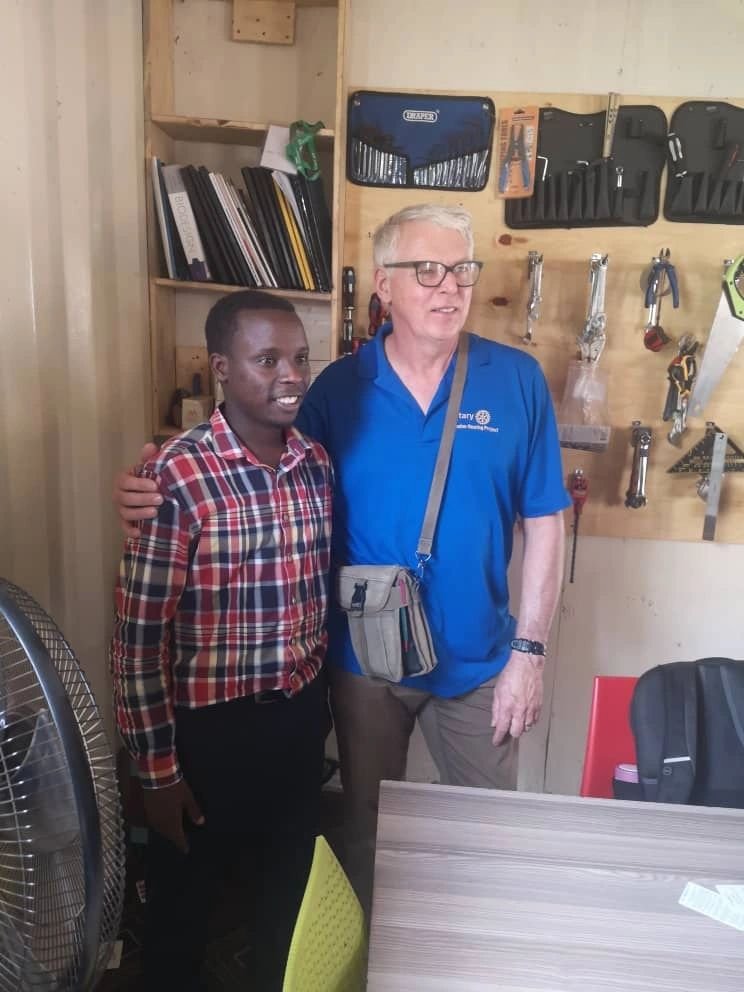
Julius Mugaga with Mr Mike Crean from the Rotary club of New Westminster, Canada
Later, I hoped to go for the burial of Mugaga but sadly I was not able to..
Mugaga was the head of Design Cube, and Faculty member of the Biomedical Engineering programme at Makerere University College of Health Sciences, which is hosted in the Department of Physiology. The design cube is an innovation space, an invention Mugaga made which was supported by the department. It is a unique innovation made from repurposed shipping containers with ample room for students and researchers, and also has tools and equipment for research and development and fabrication.
Mugaga went to Our Lady of Consolata S. S. Kireka then pursued a Bachelors of Biomedical Sciences at Makerere University College of Health Sciences. He was later retained to train some students having acquired skills in the field of biomedical sciences.
At the time of his demise, he was a research fellow at Makerere University, teaching assistant and innovator having helped many students explore and realise their potential.
How we met
I first learnt about Mugaga in 2020 on social media. I had decided to find out whether there were other people who bore the same name as me. I was surprised when I found one. Interestingly, we shared the same name, same spelling, same language (Kinyarwanda), and were of similar looks and height. What was more, Mugaga was working at Makerere University and I stayed within the university. I started to learn more about him. I would see his presentations online, full of medical innovations. I was a journalist and was impressed with what I saw. I hoped to meet him one day.
In April 2023, by God’s grace, I was employed at Makerere University, specifically the College of Health Sciences, at the School of Public Health as a communications assistant. At this point, we were now working in the same college but still hadn’t met.
I finally got to meet Mugaga this year (2024) on January 20. On this date, the College of Health Sciences hosted a delegation from the Rotary Club of New Westminster, Canada that had come to assess the impact of their biomedical engineering support.
As the proceedings went on, I was requested to leave my seat and help with taking photos and capture what was going on. To my shock the chair of the meeting called upon a Julius Mugaga to take the floor and make a presentation. I wondered whether it was me he was asking to do this, only to see someone else stand up to go and do the needful. I quickly remembered that this was the person I had seen on social media with the same name as me.
Mugaga gave a captivating presentation. He gave a background of the biomedical engineering work that the team had been doing for the last 12 years and what they had achieved. He also gave them a glimpse of what they did at the Design Cube.
After his presentation, I ran to him and said, “Nice meeting you, my namesake!”
He asked me, “What’s your name?”
I responded, “Julius Mugaga.” He was shocked. “This can’t be,” he responded.
I showed him my byline on my news website Umoja Standard News Agency and on the School of Public Health website. He then believed me and we immediately struck a friendship. He then went telling his colleagues about his namesake and brother excitedly.
Mugaga was a shrewd, self driven, innovative team player. He was also brilliant. He had done great research in biomedical device innovation, design and manufacturing. On his LinkedIn page, he described himself thus: “I am a medical device engineer with a passion for improving lives and patient outcomes through my work. I enjoy using my experience and skills in R&D, new product development, design, design thinking, design controls, Human-Centered Design, 3D printing, and subtractive manufacturing to innovate and advance medical technology in order to positively impact people across the globe, mostly those in resource-limited settings.
Innovative at work and at play
Mugaga was indeed innovative as he came up with various things such as MATICA Play the Match, a card game meant to improve how one can learn mathematics. He gifted me with a set and it is a game that I always enjoy. He also innovated the “touchless” hand-washing machine that was used in the fight against COVID-19 in Uganda which would even record the number of people that wash their hands per day.
Mugaga was a jolly person, always wanted to do quality work, and frequently thought outside the box. One evening we decided to take a walk together from the Mulago-based Makerere University College of Health Sciences through Wandegeya till we parted at the traffic lights on Sir Apollo Kaggwa road. During the walk, Mugaga shared many things that included the support he had received on behalf of different cohorts of biomedical science students to repair equipment in different health facilities across the country, the many innovations he had, and his prospects. He asked me to use my platform as a journalist to uncover health stories that in his view seem not to be prioritised, “…and you’ll be a headline my brother,” he told me.
He gave me an example of a group of Ugandans who invented the term “slim” as a description of the signs and symptoms of AIDS when it had just hit Uganda in the early 80s.
The thing I loved most about Mugaga was that he was so supportive. He told me how he had helped many students come up with different innovations. I had an opportunity to meet one of those students, Vivian Arinaitwe, who invented the low cost NeoNest that helps to securely transport newborn babies to health facilities for intensive care services and was inspired to write about her.
One of the last things I spoke about with Mugaga was when he told me that he was scheduled to fly to the United States for work, before June. I don’t know if he managed to do so before his demise. My heart goes out to the family that Mugaga has left behind. For the short time I was friends with Mugaga, he impacted me, and many others so positively. He will be sorely missed.
Related News
![]() Please join hands with the Makerere University Endowment Fund as it works towards attracting & retaining the best faculty, providing scholarships, and investing in cutting-edge research and technology.
Please join hands with the Makerere University Endowment Fund as it works towards attracting & retaining the best faculty, providing scholarships, and investing in cutting-edge research and technology.
